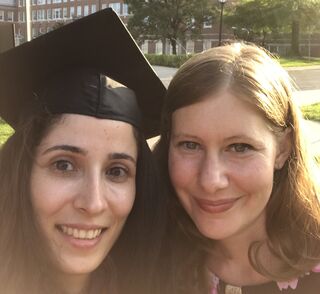Friends
The Need for Close Friends in the Recovery Process
Personal Perspective: The importance of social networks in my recovery process.
Posted November 6, 2021 Reviewed by Kaja Perina

Friendships have been vital in my thirteen-year sustained recovery from schizophrenia. Close friendships have especially enriched my life in so many ways.
Prior to developing schizophrenia in college, I had no close friends. I see my former inability to form close friendships as an early symptom that was probably too subtle to be noticed. Struggling to form close friendships is not unusual in the general public (1).
When I was exhibiting signs of schizophrenia, but not yet diagnosed, I had an affinity for friends from other countries who were unfamiliar with American culture. I spent so much time with Chinese friends that they teased me I was actually Chinese myself. Today, I have only kept in touch with one friend from that time, who was a Turkish graduate student studying math. Looking back, I probably chose these friends in part because due to culture differences, I thought they would be less likely to notice I was hiding my homelessness.
However, as my undiagnosed schizophrenia progressed, I went for several days at a time without seeing anyone. Excessive isolation can be dangerous, even for people who are mentally healthy (2). Many people with mental illness tend to isolate themselves when they need friends the most, and lack of companionship was exacerbating my symptoms.
After my diagnosis, I spent twelve months trying five medications, up to two at a time. These medications were partially effective and caused me to have severe negative symptoms such as exhaustion. That year was the most difficult time I have ever gone through socially, as I was reluctant to see anyone. In essence, I was hiding away.
But after I found the right medication in 2008, my negative symptoms dissipated. As I began a new life, I found myself easily making friends and enjoying them.
One of my closest friends today is a psychologist who I met through my church. We have a mutual interest in mental health advocacy. She was also the first person to review my memoir who was not directly involved in the editing process. By becoming a friend to me, she chose not to buy into the stigma of schizophrenia. I appreciate her knowledge and insight.
I also made friends with a physics graduate student at the University of Cincinnati. Over a]the last few years, we have had many adventures together. She is compassionate, dependable and kind. When there was a death in my family, she insisted that I spend a night at her house as a guest. Then, she dropped by to see how I was doing every day for over a week. Looking back, I needed a true friend during that time, and she was important in helping me process my grief in a healthy way. I will always hold a special place in my heart for her.
I enjoy many other friendships. I have kept in touch with University of Cincinnati students who graduated with me and a roommate who shared an apartment with me for four years. On medication and in recovery, I find making friends to be more fulfilling than I ever experienced before in my life.
I am grateful for my circle of friends and cannot imagine my life without them.
As we take precautions for COVID, which may include staying home to avoid transmission of the virus, and canceling social events, it is important to balance safety precautions with the need to see others. In person meetings can help friends connect in ways than virtual meetings cannot (2).
In my role as a mental health advocate, when families contact me to discuss their loved one’s recovery, I emphasize the vital importance of a social network. It is a key component in a successful treatment plan. Everyone needs people.
It is my earnest wish that I can be a friend to others in their journeys to recovery.
References
(1) How to Have Closer Friendships and Why You Need Them. https://www.nytimes.com/2019/11/20/smarter-living/how-to-have-closer-friendships.html, retrieved November 1, 2021.
(2) Understanding the Effects of Social Isolation on Mental Health. https://publichealth.tulane.edu/blog/effects-of-social-isolation-on-mental-health/ Retrieved November 6, 2021.


